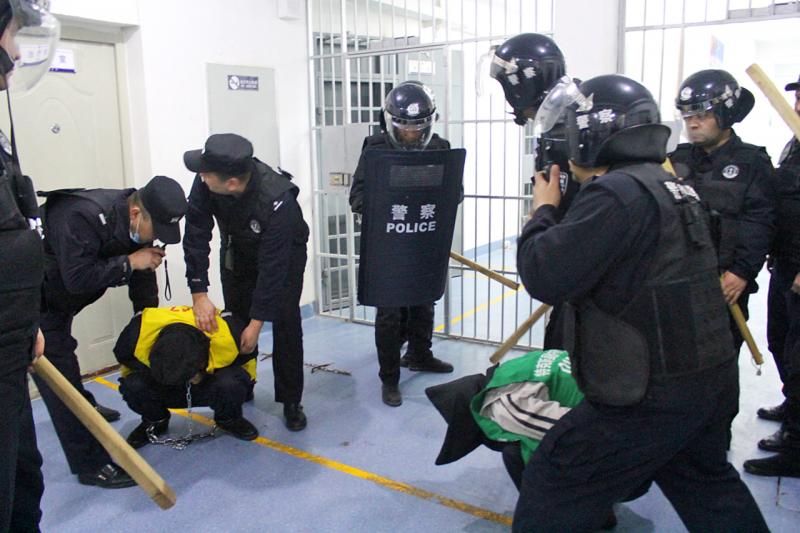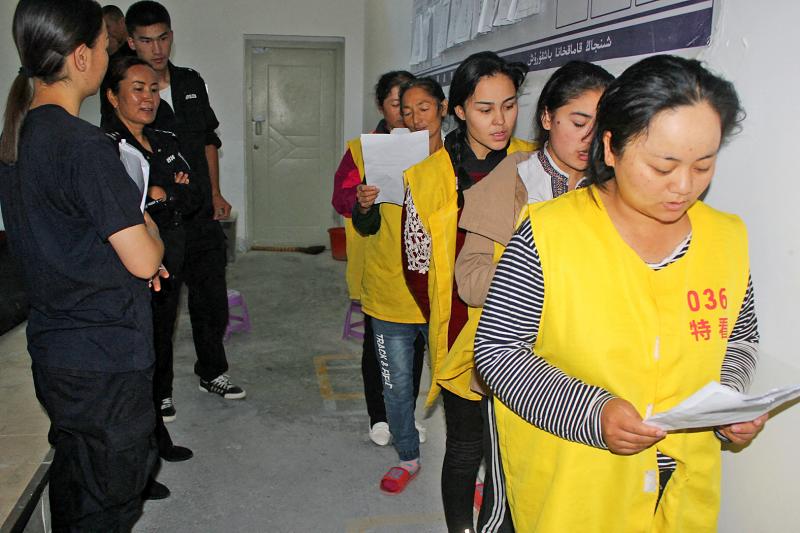Chinese President Xi Jinping (習近平) yesterday held a videoconference with UN High Commissioner for Human Rights Michelle Bachelet as she visited Xinjiang during a mission overshadowed by fresh allegations of Uighur abuses and fears she is being used as a public relations tool.
The Chinese Communist Party (CCP) has been accused of detaining more than 1 million Uighurs and other Muslim minorities in the region as part of a years-long crackdown the US and lawmakers in other Western nations have labeled a “genocide.”
China denies the allegations.

Photo: EPA-EFE
Bachelet was expected to visit the cities of Urumqi and Kashgar on a six-day tour.
The US has reiterated its view that Bachelet’s visit was a mistake after the release of thousands of leaked documents and photographs from inside the system of mass incarceration this week.
Rights advocates have voiced concern that Beijing would prevent Bachelet from conducting a thorough probe into alleged rights abuses and instead give her a stage-managed tour, but Xi defended his nation’s human rights progress during the videoconference, according to a readout from state broadcaster China Central Television (CCTV), which did not say whether Xinjiang was mentioned by either side.

Photo: AFP
“Human rights issues should also not be politicized, instrumentalized or treated with double standards,” CCTV quoted Xi as saying.
China has “a human rights development path that ... suits its national conditions,” he added.
CCTV reported Xi as telling Bachelet that there is no “ideal nation” on human rights.

Photo: AFP
He added that there is “no need for a ‘teacher’ who is bossy towards other countries” — an apparent reference to public criticisms of the trip by US and British officials.
According to the CCTV readout, Bachelet said the UN Human Rights Office is “willing to strengthen cooperation with the Chinese side.”
She was also reported to have said: “I admire China’s efforts and achievements in eradicating poverty, protecting human rights, and realizing economic and social development.”
In addition to mass detentions, Chinese authorities have waged a campaign of forced labor, coerced sterilization and the destruction of Uighur cultural heritage in Xinjiang, researchers and campaigners say.
As Bachelet started the trip, a leak of thousands of photos and official documents from Xinjiang claimed to shed new light on the violent methods used to enforce mass internment in the region.
Reported by a consortium of media, including the BBC and Le Monde, the Xinjiang Police Files showed top leaders in Beijing, including Xi, calling for a forceful crackdown.
The files, leaked by an anonymous source to German anthropologist Adrian Zenz, also included a 2017 internal speech by Chen Quanguo (陳全國), a former CCP secretary in Xinjiang, in which he allegedly orders guards to shoot to kill anyone who tries to escape.
US Department of State spokesman Ned Price on Tuesday said that the US was “appalled” by the latest allegations.
Britain and Germany also voiced outrage, with British Secretary of State for Foreign, Commonwealth and Development Affairs Liz Truss calling for China to grant Bachelet “full and unfettered access to the region,” while her German counterpart urged a “transparent investigation.”
Overseas Uighurs have staged rallies pressing Bachelet to visit relatives believed to be detained in Xinjiang.
“The UN High Commissioner on Human Rights should not look away,” Human Rights Watch senior China researcher Maya Wang (王松蓮) said. “She should also demand information about the detainees from the Chinese government, have her office develop a database of all those arbitrarily detained and imprisoned, and urgently work to secure their release.”
Bachelet’s office has said she would meet with civil society organizations, business representatives and academics, and has given assurances over her access to detention centers in calls with diplomatic sources this week.

SECURITY: As China is ‘reshaping’ Hong Kong’s population, Taiwan must raise the eligibility threshold for applications from Hong Kongers, Chiu Chui-cheng said When Hong Kong and Macau citizens apply for residency in Taiwan, it would be under a new category that includes a “national security observation period,” Mainland Affairs Council (MAC) Minister Chiu Chui-cheng (邱垂正) said yesterday. President William Lai (賴清德) on March 13 announced 17 strategies to counter China’s aggression toward Taiwan, including incorporating national security considerations into the review process for residency applications from Hong Kong and Macau citizens. The situation in Hong Kong is constantly changing, Chiu said to media yesterday on the sidelines of the Taipei Technology Run hosted by the Taipei Neihu Technology Park Development Association. With

CARROT AND STICK: While unrelenting in its military threats, China attracted nearly 40,000 Taiwanese to over 400 business events last year Nearly 40,000 Taiwanese last year joined industry events in China, such as conferences and trade fairs, supported by the Chinese government, a study showed yesterday, as Beijing ramps up a charm offensive toward Taipei alongside military pressure. China has long taken a carrot-and-stick approach to Taiwan, threatening it with the prospect of military action while reaching out to those it believes are amenable to Beijing’s point of view. Taiwanese security officials are wary of what they see as Beijing’s influence campaigns to sway public opinion after Taipei and Beijing gradually resumed travel links halted by the COVID-19 pandemic, but the scale of

A US Marine Corps regiment equipped with Naval Strike Missiles (NSM) is set to participate in the upcoming Balikatan 25 exercise in the Luzon Strait, marking the system’s first-ever deployment in the Philippines. US and Philippine officials have separately confirmed that the Navy Marine Expeditionary Ship Interdiction System (NMESIS) — the mobile launch platform for the Naval Strike Missile — would take part in the joint exercise. The missiles are being deployed to “a strategic first island chain chokepoint” in the waters between Taiwan proper and the Philippines, US-based Naval News reported. “The Luzon Strait and Bashi Channel represent a critical access

Pope Francis is be laid to rest on Saturday after lying in state for three days in St Peter’s Basilica, where the faithful are expected to flock to pay their respects to history’s first Latin American pontiff. The cardinals met yesterday in the Vatican’s synod hall to chart the next steps before a conclave begins to choose Francis’ successor, as condolences poured in from around the world. According to current norms, the conclave must begin between May 5 and 10. The cardinals set the funeral for Saturday at 10am in St Peter’s Square, to be celebrated by the dean of the College